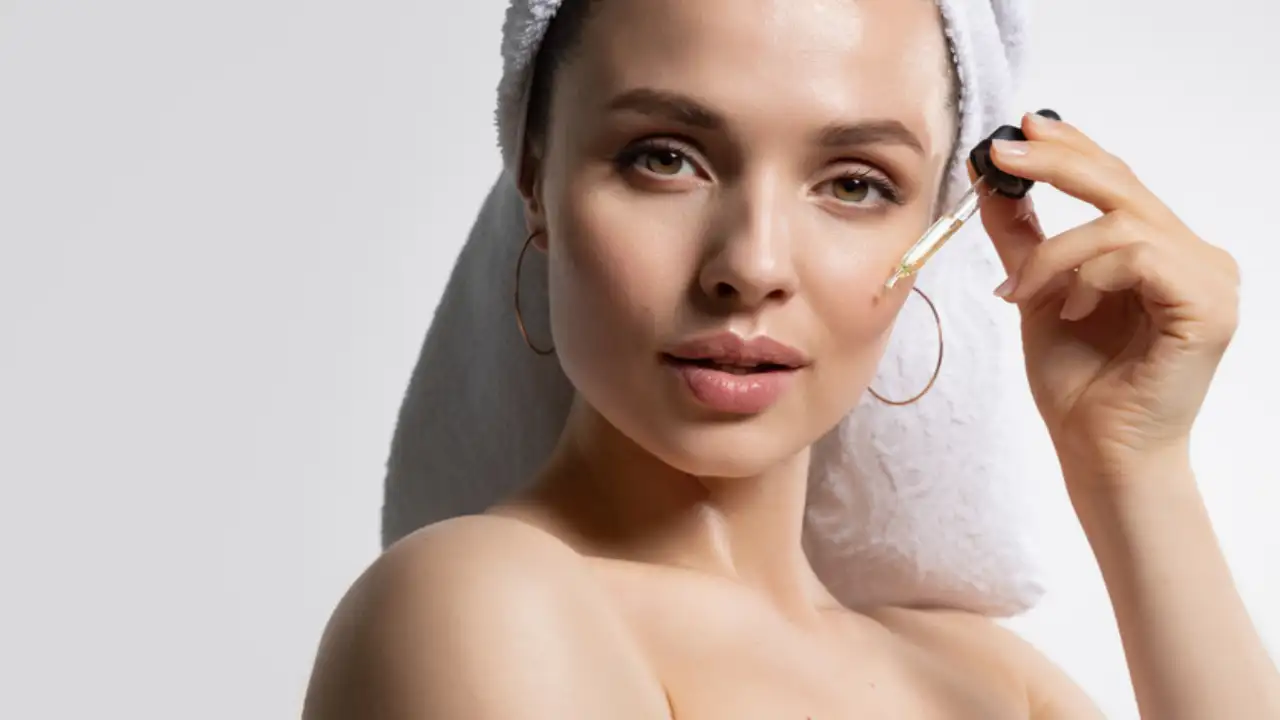Rosewater And Glycerin for Skin: Benefits, Side Effects, And Ways to Use
The combination of rosewater and glycerin for skin is a holy grail indeed. Learn about their benefits, uses, and ways to keep your skin happy.

Rosewater and glycerin for skin is a popular skincare hack, for all the right reasons! Rosewater is a mild fragrant liquid made by steeping fresh rose petals into water or distilling them with steam. Glycerin, also known as glycerol, is a natural derivative of vegetable oils or healthy fats. It has a sweet taste and is colorless and odorless.
Rosewater has been used in cosmetic formulations, cuisines, and medicines for ages. The usage of rosewater dates back to the Middle Ages when people used it for bathing. Later, Arabs started using it for culinary purposes. Today, rosewater is widely used to make desserts, fragrances, and cosmetics. Rosewater in skincare is commonly used as a toner or to prepare serums, facial packs, face creams, soaps, and moisturizers.
Glycerin, on the other hand, is used in medicines, cosmetics, soaps, lotions, candles, and makeup products. A fun fact about glycerin: Michel Eugène Chevreul, a French chemist, gave the substance its name. However, it was long discovered in 1799 by Carl Wilhelm Scheele, a German-Swedish chemist who described it as the “sweet principle of fat.” Today, glycerin is used in many cosmetic formulations and is usually mixed with cleansers, makeup removers, moisturizers, soaps, face creams, and body lotions to reap its benefits.
Scroll down to learn more about the benefits of these ingredients on the skin, both as standalone items and as a combined remedy.
Benefits of Rosewater And Glycerin for Skin
Rosewater and glycerin are used in various cosmetic formulations. Let's look at each of their benefits separately and closely.
Benefits of Glycerin for Skin
1. Keeps the Skin Moisturized

Glycerin has potent humectant properties, making it a wonderful ingredient for locking moisture in and resolving issues related to atopic dry skin (1). Glycerol, interchangeably referred to as glycerin, is considered one of the most effective humectants that prevent skin dryness and nourish the skin (2). Both glycerol and glycerin have the same chemical formulation, and the key difference is that glycerol is often used as a term for pure compound, whereas glycerin refers to commercial grades.
2. Improves Skin Barrier Function
Our skin gets damaged when there is no barrier to protect it from environmental threats. The skin barrier protects against free radicals, keeping it healthy and smooth (3). Glycerin is commonly used as a humectant in the skincare industry. The primary purpose of a humectant is to draw moisture from the atmosphere to soften the skin. Glycerin strengthens the skin barrier by penetrating deeply into the skin and locking the moisture in for a long time to keep it hydrated (4).
3. May Promote Skin Healing
Glycerin has mild antimicrobial properties that may help promote skin healing (5). It keeps the skin moisturized and also accelerates the wound-healing process (6).
4. May Improve Skin Elasticity
Skin is our body's largest organ and has the ability to stretch and bounce back to its original shape. But as we age, our skin starts losing its elasticity (7). It's important to maintain the elasticity of the skin to reduce fine lines and other premature signs of aging. Glycerin provides proper hydration to the skin, thereby giving it a plump, fuller look and improving skin elasticity (8). Without proper hydration, the skin starts losing moisture, and appears dull. This makes the fine lines, wrinkles, and open pores look more prominent.
5. Smoothens the Skin
Glycerin acts as a humectant and regular application may provide a smoother appearance to the skin (9). It also helps repair the skin barrier and helps moisturize the skin deeply, which can help in skin recovery from dryness and damage.
Benefits of Rosewater for Skin
1. May Delay Premature Aging of Skin

Antioxidants are a boon to the skin as they prevent oxidative damage to skin tissues (10). They also delay the process of skin aging by shielding the skin against damage from UV rays (11). Damask rose, the primary ingredient in rose water, is known to have strong antioxidant properties that help maintain the youthfulness and health of the skin (12).
2. May Help Treat Sunburn
Anti-inflammatory properties of an ingredient help reduce inflammation or swelling. Rose petals have anti-inflammatory properties that may help soothe sunburn which may present as redness, irritation, and inflammation. It should be duly noted that the anti-inflammatory properties of rose petals extract is due to its antioxidant activity (13). In addition, extract of the Damascus rose has been shown to have a wound healing effect on the skin (12).
3. May Strengthen Skin’s Immunity Against Infections
Antimicrobial properties of an ingredient help inhibit the growth of fungi and bacteria, thereby reducing skin diseases that may cause skin redness, itchiness, and swelling (14). The strong antimicrobial properties of damask rose make it a magical ingredient to fight microbes and keep the skin’s immunity strong and healthy (12).
4. May Help Tighten Skin Pores
Damask rose's astringent and soothing properties may help tighten skin pores (15). Large skin pores may cause problems such as blackheads, acne, and skin bumps, leading to dull skin. Tight skin pores may help prevent buildup of bacteria on the skin and make the skin look clearer.
How to Use Rosewater And Glycerin for Skin
As mentioned above, there are various glycerin and rosewater benefits for the skin. When blended, they prove to be an exceptional beauty elixir and when used correctly, this amazing combination can ward off various skin problems. One can make various DIY recipes easily from the comfort of their home. Let us take a look at the best ways to use rosewater and glycerin for skin.
1. As a Toner
Ingredients to be Used:
- 2 teaspoons vegetable glycerin
- 4 tablespoons rose water
- 2 drops of essential oil (optional)
- A spray bottle
How to Make
Mix rose water with glycerin; if you want, add two drops of essential oil of your choice to it. People with oily and acne-prone skin can use tea tree oil as it helps control sebum production, thereby reducing the occurrence of breakouts (16). Shake well and use it after cleansing your face.
Benefits
Our skin is naturally acidic, so it's important to keep the skin's pH levels balanced to maintain its health (17). A healthy pH balance helps lock moisture in and keep bacteria out of the skin. Toning might be helpful in fighting acne and improving the overall appearance of the skin (18).
2. As a Serum

Ingredients to be Used:
- 1 tablespoon glycerin
- 1 tablespoon fresh aloe vera gel
- 1 tablespoon rose water
- 1/2 teaspoon vitamin C powder
- 1/2 teaspoon argan oil
- A funnel
- A sterilized glass spray bottle
How to Make
Gather all the ingredients and mix them into a bowl. Use a funnel to pour this into a bottle and use this as a night serum.
Benefits
Facial serums are known to boost skin health by reducing the appearance of wrinkles, improving skin resilience, and boosting skin firmness (19). There are many benefits of aloe vera gel for the skin: it helps treat skin wounds, has anti-inflammatory properties, moisturizes the skin, delays the signs of aging, and protects the skin against radiation damage (20, 21). Vitamin C is an antioxidant and helps prevent the photoaging of skin (22). Argan oil protects the skin from the damage of UV rays and may also be beneficial in reducing stretch marks (23, 24). All in all, this is one of the best ways to use rosewater and glycerin for skin.
3. As a Moisturizer
Ingredients to be Used:
- 1/4 cup rose water
- 1 teaspoon vegetable glycerin
- 1/4 cup of distilled water
- 2 tablespoons of grated emulsifying wax/beeswax
- 1/4 cup of sweet almond oil
- 1/4 cup of argan oil
- 2 - 4 drops of rose essential oil
- A sterilized jar
How to Make
Use the double boiler method to melt beeswax/emulsifying wax. Fill the bigger pot with one to two cups of water and place it on the stove. Now take the smaller pot and add beeswax into it. Place the small pot into the bigger one, and allow the beeswax to melt on medium to low heat. When it's melted properly, keep it aside and whisk it gently. Mix rose water, glycerin, and oils in it slowly and gradually, and keep whisking steadily. As you keep whisking, the mixture will thicken. When you get the desired consistency, stop whisking and allow it to cool completely. After that, add a few drops of rose essential oil and store this in a clean jar. Use it after cleansing and toning your face, or you can also use it as a night moisturizer.
Notes:
- A double boiler method is a technique of boiling something using two pots. Of the two pots, one should be bigger in size and the other one smaller.
- If you find the mixture too sticky, you can add in more distilled water.
Benefits
Moisturizers have a host of benefits for the skin. From preventing dryness to providing a cooling sensation to the skin, it serves as a boon for our skin (25).
Beeswax has been used in cosmetic formulations for years. It lubricates the skin, regenerates the skin, and keeps it supple (26). Almond oil is a natural emollient that penetrates deeper into the skin, makes it soft, and improves skin tone (27). Rose oil has therapeutic properties that relax the body and provide rejuvenating effects (28).
4. As a Makeup Setting Spray
Ingredients to be Used:
- 6 tablespoons of rose water
- 2 tablespoons of glycerin
- 2 tablespoons of witch hazel
- 2 tablespoons of aloe vera water
- 4 drops of essential oil (optional)
- A clean spray bottle
How to Make
Get all the ingredients, stir well, and pour them into a clean, sterilized bottle. Shake it and use it to give your skin a boost of hydration while setting your makeup.
Benefits
Makeup is an art, and the artist who does it, of course, feels bad when it gets ruined. You can avoid this problem by using a makeup setting spray. Rosewater and glycerin for skin are also used to make a makeup setting spray. Witch hazel is an efficient ingredient for getting relief from inflammation (29). On the other hand, Aloe vera is loved by all because it replenishes moisture (20).
5. As a Soap

Ingredients to be Used:
- 100 grams SLS free glycerin soap base
- 2 grams of rose water
- 1 gram rose clay powder
- 1 gram of jojoba oil
- A few drops of fragrance/essential oil
- Soap mold
How to Make
Get an SLS-free glycerin soap base and cut it into small cubes. Melt it using the double boiler method. Take a separate bowl and put rose water, rose powder, and jojoba oil in it. When the soap base starts melting, add this mixture to it. Stir slowly, and when it's completely melted, take it off the stove. Add a few drops of essential oil or fragrance. Pour this into a soap mold and keep it aside for a few hours. Your homemade soap will be ready in 6 to 8 hours.
Benefits
Soaps are necessary to cleanse the skin thoroughly and get rid of dirt and grime. Making soap using glycerin and rose water is ideal as it solves various skincare purposes.
Jojoba oil is a gentle carrier oil with amazing humectant properties that retain moisture in the skin and prevent bacterial infections (30). All in all, this is one of the best soap recipes for all skin types.
6. As a Face Mask
Ingredients to be Used:
- 1 tablespoon glycerin
- 2 tablespoons rose water
- 1 teaspoon honey
- Cotton pads
How to Make
Mix all the ingredients in a bowl to make a smooth paste. Apply all over your face and massage gently using your fingertips. Let it sit on your face for about 10 minutes, then rinse it with cold water.
Benefits
Honey is used topically all over the world for a host of dermatological problems. It heals skin wounds, boosts skin hydration, and improves skin appearance (31, 32). A face pack with glycerin and rose water helps keep the skin radiant.
Tips to Consider While Using Rosewater And Glycerin for Skin

Although both rosewater and glycerin are natural ingredients that are safe to use, there are some measures one must practice before using them for the skin.
1. Do not use glycerin directly on your skin. Always dilute it with rosewater before trying it on your skin.
2. Whatever remedy you try, make sure to do a patch test on your skin. You may also visit a dermatologist to check if you are allergic to rose water or glycerin.
3. Go for organic glycerin and rosewater, and opt for products that are free of fragrance and artificial preservatives that may be harsh to your skin.
4. People with sensitive, oily, or combination skin types should use glycerin and rosewater once a week, as too much use can make the skin greasy.
Where Can You Get Rosewater and Glycerin for Skin?
You can get both ingredients at any nearby cosmetic store, or online.
Are There Any Side Effects of Rosewater And Glycerin for Skin?
Although, both glycerin and rosewater are extremely beneficial for the skin and are safe, if you are allergic to either of those or both, they can do more harm than good. That's why always do a patch test before using them on your skin. If you experience any allergic reactions including
redness, swelling, stinging sensation, rashes, itching, or burning sensation, discontinue use immediately.
Conclusion
Even though the market is flooded with a lot of commercial products, if you take a close look at your kitchen shelf, you'll find many ingredients that are a boon for your skin. Rosewater and glycerin too, are such ingredients that are commonly available in the market and are used in many households for various purposes. But not everyone knows about the uses of rosewater and glycerin for skin. So, now that you know the ways to use them, grab them and say goodbye to all your skin woes.
Sources :
1. A double-blind study comparing the effect of glycerin and urea on dry, eczematous skin in atopic patients. Acta-dermato venereologica, US National Library of Medicine, National Institutes of Health.
https://pubmed.ncbi.nlm.nih.gov/12013198/
2. Moisturizers: The Slippery Road
https://www.ncbi.nlm.nih.gov/pmc/articles/PMC4885180/
3. Understanding the Epidermal Barrier in Healthy and Compromised Skin: Clinically Relevant Information for the Dermatology Practitioner.
https://www.ncbi.nlm.nih.gov/pmc/articles/PMC5608132/
4. Dynamics of glycerine and water transport across human skin from binary mixtures.
https://pubmed.ncbi.nlm.nih.gov/27566278/
5. Glycerin-Based Hydrogel for Infection Control
https://pubmed.ncbi.nlm.nih.gov/24527279/
6. Glycerol and the skin: holistic approach to its origin and functions.
https://pubmed.ncbi.nlm.nih.gov/18510666/
7. Characteristics of the Aging Skin.
https://www.ncbi.nlm.nih.gov/pmc/articles/PMC3840548/
8. Glycerol replacement corrects defective skin hydration, elasticity, and barrier function in aquaporin-3-deficient mice.
https://www.pnas.org/doi/10.1073/pnas.1230416100
9. Glycerol accelerates recovery of barrier function in vivo.
https://pubmed.ncbi.nlm.nih.gov/10598752/
10. Antioxidants in dermatology
https://www.ncbi.nlm.nih.gov/pmc/articles/PMC5514576/
11. Bioactive Compounds for Skin Health: A Review
https://www.ncbi.nlm.nih.gov/pmc/articles/PMC7827176/
12. Pharmacological Effects of Rosa Damascena
https://www.ncbi.nlm.nih.gov/pmc/articles/PMC3586833/
13. Skin anti?inflammatory activity of rose petal extract (Rosa gallica) through reduction of MAPK signaling pathway
https://www.ncbi.nlm.nih.gov/pmc/articles/PMC6261181/
14. Antimicrobial peptides and the skin immune defense system
https://www.ncbi.nlm.nih.gov/pmc/articles/PMC2639779/
15. Response of damask rose (Rosa damascena Mill.) to foliar application of magnesium (Mg), copper (Cu) and zinc (Zn) sulphate under western Himalayas.
https://www.sciencedirect.com/science/article/abs/pii/S0926669015306543
16. Tea tree oil gel for mild to moderate acne; a 12 week uncontrolled, open-label phase II pilot study
https://pubmed.ncbi.nlm.nih.gov/27000386/
17. Natural skin surface pH is on average below 5, which is beneficial for its resident flora
https://pubmed.ncbi.nlm.nih.gov/18489300/
18. Efficacy of a twice-daily, 3-step, over-the-counter skincare regimen for the treatment of acne vulgaris
https://www.ncbi.nlm.nih.gov/pmc/articles/PMC5221538/
19. Efficacy and Tolerability of a Facial Serum for Fine Lines, Wrinkles, and Photodamaged Skin
https://www.ncbi.nlm.nih.gov/pmc/articles/PMC3140905/
20. The Effect of Aloe Vera Clinical Trials on Prevention and Healing of Skin Wound: A Systematic Review
https://www.ncbi.nlm.nih.gov/pmc/articles/PMC6330525/
21. ALOE VERA: A SHORT REVIEW
https://www.ncbi.nlm.nih.gov/pmc/articles/PMC2763764/
22.Vitamin C in dermatology
https://www.ncbi.nlm.nih.gov/pmc/articles/PMC3673383/
23. Activation of MITF by Argan Oil Leads to the Inhibition of the Tyrosinase and Dopachrome Tautomerase Expressions in B16 Murine Melanoma Cells
https://www.ncbi.nlm.nih.gov/pmc/articles/PMC3723062/
24. Preliminary study on the development of an antistretch marks water-in-oil cream: ultrasound assessment, texture analysis, and sensory analysis
https://www.ncbi.nlm.nih.gov/pmc/articles/PMC5019162/
25. The Role of Moisturizers in Addressing Various Kinds of Dermatitis: A Review
https://www.ncbi.nlm.nih.gov/pmc/articles/PMC5849435/
26. Bee Products in Dermatology and Skin Care
https://www.ncbi.nlm.nih.gov/pmc/articles/PMC7036894/
27. The uses and properties of almond oil
https://pubmed.ncbi.nlm.nih.gov/20129403/
28. Therapeutic efficacy of rose oil: A comprehensive review of clinical evidence
https://www.ncbi.nlm.nih.gov/pmc/articles/PMC5511972/
29. Antioxidant and potential anti-inflammatory activity of extracts and formulations of white tea, rose, and witch hazel on primary human dermal fibroblast cells
https://journal-inflammation.biomedcentral.com/articles/10.1186/1476-9255-8-27
30. Characterization, sensorial evaluation and moisturizing efficacy of nanolipidgel formulations
https://pubmed.ncbi.nlm.nih.gov/24772476/
31. Honey: A Therapeutic Agent for Disorders of the Skin
https://www.ncbi.nlm.nih.gov/pmc/articles/PMC5661189/
32. Honey in dermatology and skin care: a review
https://pubmed.ncbi.nlm.nih.gov/24305429/
33. Formulation and physical characterization of herbal face gel toner
34. Assessment of Rose Water and Evaluation of Antioxidant and Anti-inflammatory Properties of a Rose Water Based Cream Formulation





 JOIN OUR WHATSAPP CHANNEL
JOIN OUR WHATSAPP CHANNEL













































